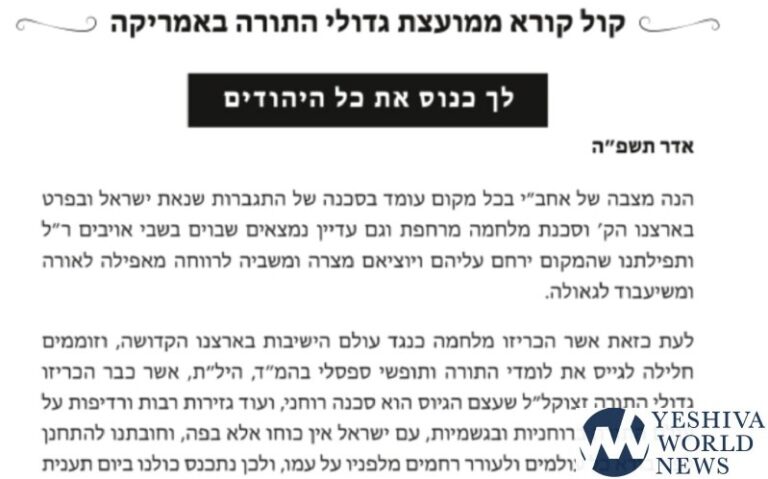 Israel’s Orthodox Rabbinate has been under siege of late, over the issue – once again – of conversion. And once again as well, the media abound with misinformation. This time, though, some of it is being supplied by Orthodox rabbis.
Israel’s Orthodox Rabbinate has been under siege of late, over the issue – once again – of conversion. And once again as well, the media abound with misinformation. This time, though, some of it is being supplied by Orthodox rabbis.
Writing in the Jerusalem Post, the retiring rabbi of an historic New York Orthodox synagogue assailed Israel’s Rabbinate for “raising obstacles to prevent non-Jews from entering the Jewish fold.” He accuses the religious authorities of having “adopted a haredi position that conversion is available only to those agreeing to observe Torah and mitzvot in full,” asserting that the Talmud, the Rambam and the Shulchan Aruch say otherwise.
In the same periodical, a second Orthodox rabbinic commentator, the director of an educational institute in Israel, vented similar displeasure with Israel’s Rabbinate. The fact that Israel has become home to hundreds of thousands of non-Jewish Russian immigrants, he argues, “demands that the Rabbinate reach out to them in order to facilitate their beginning the process of conversion.” That such has not happened, the rabbi went on, is proof that the Jewish State’s rabbinic authorities “are more concerned with safeguarding halakhic authority than with welcoming Jews to embark on a spiritual process.”
Or perhaps more concerned with halachic integrity than with pleasing a populace.
The image of masses of sincere neophytes yearning to join the Jewish people but being rebuffed by small-minded religious functionaries plays well in the press. As does the notion that commitment to Jewish religious observance is not a requirement for conversion. Both, though, are at odds with reality.
There are certainly non-Jews in Israel who sincerely wish to convert to Judaism, not merely to cement their status as citizens of Israel but to wholeheartedly join the Jewish People and its mission.
But there are many more non-Jews in Israel, among them many immigrants from the former Soviet Union, who may wish to be considered Jews but who have no interest in undertaking Jewish observance.
And sincere acceptance of the responsibility to strive to observe all of the Torah’s laws – or “kabbolas hamitzvos” – is the very sine qua non of Jewish conversion. A convert need not be conversant with all of the laws but must nevertheless embrace them in principle, as Klal Yisroel did at Har Sinai before receiving the Torah.
When a non-Jew seeks to convert solely for the purpose of marrying a Jew, pleasing a spouse or just feeling more Israeli, Jewish law is clear that the request should not be entertained. If a legitimate Jewish court is convinced that the non-Jewish partner in an intermarriage is in fact willing to shoulder kabbolas hamitzvos, respected poskim have not considered the marriage factor to be a bar to conversion.
But should a non-Jew without any such willingness somehow manage to be accepted by a rabbinical court and go through the motions of geirus – a formal declaration of kabbolas hamitzvos, immersion in a mikva and, in the case of a male, actual or symbolic bris milah – halacha is equally clear: the conversion is entirely invalid.
One of the rabbis quoted above has tried to insinuate otherwise, citing codified halachic sources to the effect that once a conversion is performed, no amount of backsliding can change the convert’s status as a Jew.
That is indeed true. But only, the sources are clear, when the conversion was valid in the first place – i.e. there was an acceptance at the time, sincere and unmitigated, of the Torah’s commandments. Should it become clear – and certainly in a case where it was always clear – that the professed embrace of the Torah’s commandments was a sham, so was the conversion. The “convert” never was one.
Proponents of the “relaxation” of conversion standards in Israel often cite poignant, agonizing cases of non-Jews who were not accepted for conversion or whose conversions were not recognized by rabbinical authorities. There can be no denying that human pain can result from the application of Jewish law, no less than it can from the laws of physics, or from life itself.
But ignoring halacha is not an option. And doing so can take its own human toll. Were Israel to “relax” its conversion standards, children of the beneficiaries of that change who might one day become observant would discover that they need to convert to be Jewish. Young women engaged to cohanim would discover that they, as converts, cannot halachically marry their chassanim. What is more, the Jewishness of every ger and ger’s child would become questionable to all halacha-respecting Jews. Only a universally accepted halachic standard can ensure that observant Jews embrace converts as we should, and prevent the Jewish People from becoming, chas visholom, a multitude of “Jewish peoples.”
One of the rabbis mentioned above chided Israel’s Rabbinate by reminding it that human beings are not “chess pieces.” He is right. What is more, the Jewish People is not a club, and halacha is not a game.
© 2007 AM ECHAD RESOURCES
[Rabbi Shafran is director of public affairs for Agudath Israel of America.]











9 Responses
The same Rabbi wrote that Modern orthodoxy has become a cult where rabbis go to Roshei yeshiva to ask questions (heaven forfend).
This is what zionism has done to supposedly Orthodox Rabbis.
#3 Even in the middle ages, there has never been one standard for geirus. What is the connection to “zionism”, in the 50 states of the USA, rabbanim of different communities have some more and some less stringencies?
These Rabbis who want to “relax” the rules for geirus are part of the zionist movement.
They want to accept anyone who will wear a star of david on their chest, irregardless whether they will keep the Torah.
Rabbi Shloime Ezagui
Chabad of Palm Beach
561-624-7004
http://www.chabadcenterpalmbeach.com
Dear Editor,
_______________________________________
On the article ”Conversion to Judaism” the author portrayed a picture where the standards and process of conversion if any, in traditional times, amount to the following.
It is possible that a halachically acceptable convert does not even know of Shabbat, there is no specific regimen for conversions and once converted the person is always fully accepted. Fulfillment of Mitzvot is not necessarily important, Rabbi Uziel – Mishpetai Uziel, was an example of someone with a less than extreme view on conversion and that imposing standards by the chief Rabbinate of Israel would invalidate any existing conversions.
The author speaks of a situation where a boy friends observance of Halacha is considered by a Bet Din in the equation of converting his fiancée as a zealous position to take, requiring a prospective convert to live like a Jew before conversion is ridiculous and we shouldn’t consider establishing standards today because it might change again in 20 30 years. And since the ways of Torah are pleasant everyone should be entitled to make his own “standards” .
Since the author wrote for a newspaper and did not quote too many sources, I will limit myself primarily to the authors own sources.
The Rambam in Isurai Biah chap. 12 para 17 is extremely clear. A convert must accept ALL the Mitzvot in the Torah. (Which Reb Moshe Feinstein says includes all the Takanot of the Rabbanim, which are themselves dictated by the Torah). The Rambam Chap. 13 para 14 thru 17 further states the declaration can not be for an ulterior motive, either out of “fear, benefits, prospective spouse” because if so, even if they were to go through the motions of conversion, i.e. they already converted with a Beit Din, “we don’t fully accept them or push them away we wait to see what their end will be”. In other words they remain as far as the Jewish community is concerned not fully accepted and in a holding pattern until they prove themselves to be totally committed. At this juncture and in this situation “they are not considered a righteous convert – Ger Tzedek”.
That is why the Rambam says the converts in the times of Shimshon and Shlomo Hamelech were considered like Goiyois – Gentiles. It was assumed people were converting in those times for ulterior motives and the Bait Din in those days therefore would not accept converts.
The Rambam further quotes from the Talmud “Converts are as difficult (painful) to the Jewish people like Tzaraas – Leprosy” “ because a majority (of converts) turn to Judaism for ulterior motives and fool the Jewish people and in the end bring calamity to the Jewish people.”
The Mishpetai Uziel quoted by the author of the article as being less that extreme says Y”D Vol. 2 # 66 “… a formality conversion (where there isn’t true kabalat hamitzvot) which only changes a persons name is not desirable and does not establish the convert to be a Jew for any matter, because Torat Yisrael is a Torah of the heart and the mind and not a ceremonial Torah which doesn’t have heart and mind “
In Another Teshuvah Y”D 53 where he discusses a Non Jewish male married to a Jewess who expresses interest to convert the Mishpetai Uziel writes – “when a convert converts for an ulterior motive once the reason ceases not only will the person turn back to his old ways but even while he acts Jewish it’s only on the surface and in his heart he is connected to his past”… its only when we can see an authentic reason for him to convert that he agrees to a conversion in this scenario and ends with “vehu rachum yechaper ovoin”…!!! May G-d forgive us from all our sins.
Reb Moshe Feinstein brings in a Teshuvah Even He-ezer 27 where a Jew married a non Jewess who now claims interest in converting, the concern that if the Jewish husband is lax in his observance (mechalel Shabbat etc.), it may affect the non Jewess’s attitude to think, why should she be any better than him (a born Jew) and this may be an issue of concern in having her convert, but finally concludes (not much different than the Mishpetai Uziel) that perhaps we can consider her interest in Judaism as authentic (she will ignore her husbands lack of observance) and we should find some “simple” Rabbonim to convert her since “ many Rabbonim Talmidei Chachomim who fear G-d, don’t want to involve themselves in matters of conversions”.
As to the example (which may have never occurred) in the Talmud regarding the “possibility” of a convert who doesn’t know about Shabbat. Because the Talmud gives an extreme example regarding the rules of Shabbat are we to say the Talmud intended this to be an example of a proper conversion.? From the Rambam quoted above, who draws all his rules from the Talmud, the answer is clearly not.
As a Rabbi “in the field” for 20 years I will tell you, conversions have become a huge wholesale joke even when administered by Orthodox and Chassidic Rabbis. When I see entire families, i.e. the father mother and children converted and they have no idea what keeping Shabbat is about , Taharat Hamishpacha, making blessings over food and no interest to study we have invited a huge problem in our people.
When I see a couple converted because they want to move to Israel as “Jews” and get immediate benefits while profaning the Holidays and can’t read Hebrew, we have added an unnecessary burden to our people. When I talk to a recently “converted” woman living with an Israeli boyfriend and when asked what blessing do we make over bread, after getting her paper she reads for me in phonetics the Asher yatzar – blessing when having relieved oneself, we are lowering the averages of “OUR” people. Not to speak of the fact that she has no interest in observing mitzvoth and tells me clearly she has no time or interest to study further.
From all the literature it is clear that the sincerity and motives of the would be convert is of utmost importance. It has to be leshaim Shamayim , for the pure sake of Heaven, period. That’s what either validates or disqualifies the entire process. No one requires us to make a scholar of the convert before converting. Even en entire lifetime isn’t enough for the study of Torah. It’s the sincere and honest commitment to the Jewish way of life (that they claim to be committed to pursuing) that matters.
This is why many Batei Dinim require a period of time to study and live like a Jew before, the process of conversion. This is to test the sincerity and commitment to living like a Jew. This is why we need to have clear and strict guideline that will be fool proof and will help to a greater degree eliminate the ones that the Rambam says “ who fool the Jewish people” .. and later on become a thorn in our sides.
No one is talking about disqualifying any conversions that were already done and that was made very clear. We’re talking about implementing standards in the spirit of the Halacha itself, and in the spirit of the Batei Dinim of Shimshon and Shlomo Hamelech, that will offer us clear and concise parameters and context, that will define and help compare a situation with the guidelines Torah tells us we must follow to consider a convert, converted.
Some of our prophets , and greatest Rabbis were converts or descendants of converts. Mashiach himself is a descendant of a convert. The souls of converts stood before Har Sinai. G-d Himself is the father of converts. However, our tradition has never been one of evangelism. We have plenty of responsibility in dealing with our own present Jewish brothers and sisters. Standards in conversion will help preserve and protect the holiness and specialness and uniqueness of the Jewish people, “ and you will be for me a treasured nation … a Holy people.” Let us preserve and protect our treasure.
#5 mosi shem rah
It would be interesting to know whether these rabbis, who now want to be meikel with kabbalas mitzvos, supported Rav Goren’s psak to metaher the mamzerim because their mother’s first husband who was a ger was not mekayem mitzvos bishlemus.
If anyone needs reminding of the potential problems brought upon our people by false geirus, one need look no further than the Gemorahs regarding the Cusim (known today as the Samaritans, living in Eretz Yisroel) who ”converted” in the time of Yehoshua. Later on, when it was clear they never were sincere in their geirus, and were not keeping the mitzvos properly, they were officially expelled from Klal Yisroel.
Uniform standards is the only way.
Quite unlikely in our day and age.